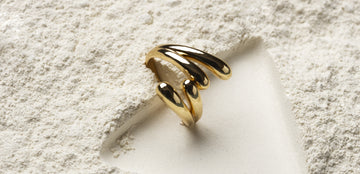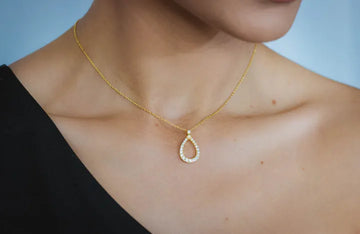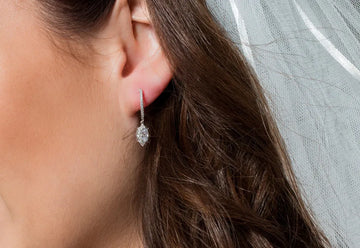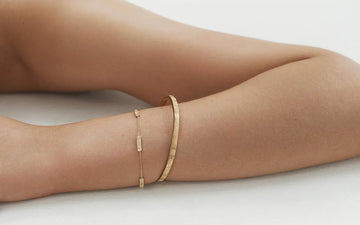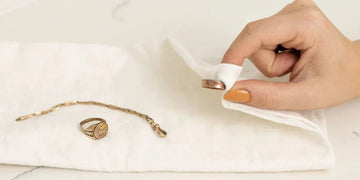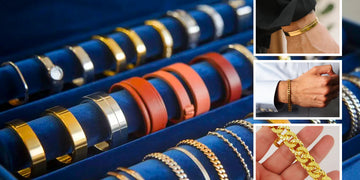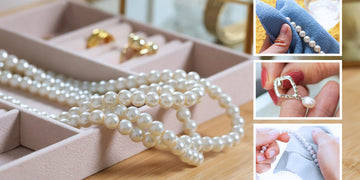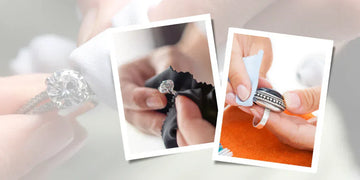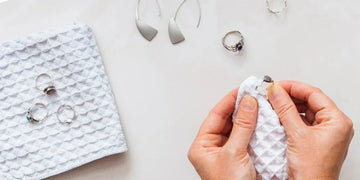Gold jewellery is a symbol of elegance and style. Everyone enjoys the gloss of gold, whether it's in a bracelet, ring, or valuable necklace.
Gold jewellery may, however, fade over time. Don’t worry, though! It can be cleaned easily. It's simpler than you'd think to clean your gold jewellery at home.
Your jewels will appear brand new and shine again with the correct care and attention as well as using a few home products properly.
Here's a guide on how to polish your gold jewellery so it will stay brilliant for years to come.
What Causes Gold Jewellery to Tarnish?
Let's find out why gold jewellery loses its brilliance before we discuss the techniques. Daily use exposes your jewellery to various chemicals that could dull its shine.
Skin Oils and Sweat: Natural oils and sweat from your skin may build up on the surface and can produce a drab coating.
Cosmetics and Lotions: Many perfumes, hairsprays, lotions, and cosmetic products have compounds that could react with gold alloys.
Household Chemicals: Cleaning detergents, chlorine from swimming pools, and other home chemicals can produce discolouration and damage.
Dust and Dirt: Jewellery may acquire a filthy covering from airborne particles.
Alloy Reactions: Gold is sometimes alloyed with other metals. Tarnish may occur when these metals react with moisture and oxygen.
This is particularly crucial when deciding how to clean gold-plated jewellery, as the coating is rather thin and easily damaged.

What You Need to Clean Gold Jewellery:
Before you start cleaning your gold jewellery, gather these simple tools and supplies:
-
Mild dish soap (or soap with natural ingredients)
-
Warm water (avoid hot water)
-
A small bowl for soaking
-
A soft-bristled toothbrush
-
Lint-free cloth (such as a polishing cloth or a soft cotton cloth)
-
A microfiber cloth (for polishing and buffing)
The Gentle Approach: Mastering the Dish Soap Technique:
The dish soap approach is still the mainstay of home gold jewellery cleaning for simple gold items. It is fast, safe, and easily available.
Detailed Steps for Optimal Results
Choosing the Right Bowl: For this purpose, select a non-reactive bowl, like ceramic or glass. Avoid metal dishes, as they can scratch the gold.
Temperature Control: Use lukewarm water; certain jewels or adhesives may be damaged by too high or low temperatures.
Soap Selection Matters: Select a mild, pH-balanced dish soap that's free from harsh chemicals and fragrances.
Creating the Ideal Solution: To make a sudsy solution, gently swirl a few drops of dish soap into the water. Steer clear of too strong suds as they might complicate rinsing.
Strategic Soaking: Submerge the gold jewellery in soapy water and gently soak it for twenty to thirty minutes. This will free tough dirt and filth.
Targeted Scrubbing: To carefully clean any last bits of filth, use a soft-bristled brush—a baby toothbrush or a specialised jewellery brush. Pay extra attention to settings, clasps, and complex designs.

Meticulous Rinsing: Fully rinse the jewellery under cold, flowing water. Make sure all of the soap residue is gone, as it will diminish the sheen and attract dirt.
Drying with Precision: Lay the jewels on a soft, lint-free cloth or microfibre towel to air dry completely. Avoid paper towels as they can leave fibres behind.
Polishing for Enhanced Shine: Use a jewellery polishing cloth made especially for gold to buff the surface and bring back its lustre gently.
How to Clean Gold Jewellery with Precious Stones:
Cleaning gold jewellery, including precious stones, requires extra attention. While softer stones, including emeralds, opals, and turquoise, require further care, gems such as diamonds, rubies, and sapphires are durable. Here's how to polish gold jewellery set with various gemstones:
Diamonds, Sapphires, and Rubies:
Hard stones such as diamonds, sapphires, and rubies may resist the same cleaning techniques used on gold jewellery.
They may be softly scrubbed with a toothbrush after soaking in warm water and mild dish soap. However, be careful with the settings to prevent prong damage.
Emeralds, Opals, and Turquoise:
Emeralds, opals, and turquoise are more fragile and porous stones that may easily be damaged and absorb liquids.
Clean jewellery with these gemstones using just warm water and mild dish soap. Steer clear of extensive length soaking for them.
Pearls:
Pearls are especially delicate and should be cleaned gently. Use a makeup brush dipped in warm water mixed with a mild shampoo to clean pearls. Avoid using any harsh chemicals or soaking pearls, as they can lose their lustre.
How to Clean Gold-Plated Jewellery:
Gold-plated jewellery is made by coating a base metal with a thin layer of gold. It requires special care because the gold layer can wear off over time. Here's how to clean gold-plated jewellery properly:
Create a Cleaning Mixture:
Mix warm water with a small amount of mild hand soap in a bowl. It's best to use soap with natural ingredients as it’s gentler on the gold-plated surface.
Soak the Jewellery:
Add the gold-plated jewellery to the solution and let it soak for five to ten minutes. Steer clear of soaking several pieces at once to avoid scratches.
Clean Gently:
Use a soft-bristled toothbrush or a microfiber cloth to clean the jewellery. Focus on small areas and avoid using abrasive materials that could damage the gold plating.
Rinse and Dry:
Rinse the jewellery with fresh water then gently dry it with a soft, lint-free towel. For more gloss, rub the surface with the towel.
How Often Should You Clean Your Gold Jewellery?
While gold jewellery doesn't tarnish as easily as silver, it may still lose its gloss with frequent use. Regular handling and lotion, oil, and other material exposure might accumulate dirt.
Jewellery worn often should be cleaned once a month. Jewellery you wear less often should be cleaned in every few months.
Clean your jewellery immediately if it seems dull or has tarnish to bring it back to shine. Regular cleaning helps keep the shine and prevents dirt from accumulating, which can cause discolouration or skin discomfort.
Tips to Keep Gold Jewellery Clean for Longer:
Here are some helpful tips to keep your gold jewellery in superb condition for as long as possible:
Remove Jewellery When Washing Hands or Bathing: Soap can form a film on your jewellery, causing it to look dull. Always remove your gold jewellery before washing your hands or taking a shower.
Avoid Chemicals: Chlorine, salt water, and strong chemicals can damage gold jewellery. Always remove jewellery before swimming, using hot tubs, or applying hair spray, makeup, or lotions.
Store Jewellery Properly: Keep your jewellery in a fabric-lined jewellery box or pouch to prevent it from scratching or dulling. Store items separately to avoid them rubbing together.

Take Off Jewellery Before Physical Activities: Activities such as exercising or gardening can expose your jewellery to dirt and sweat, which can cause a build-up. It’s best to remove your jewellery during these activities.
Professional Cleaning: When to Seek Expert Assistance?
While home cleaning methods are effective for routine maintenance, certain situations necessitate professional intervention.
Stubborn Tarnish or Discolouration: If your jewellery has stubborn tarnish or discolouration that doesn't respond to home cleaning, a professional jeweller can use specialised equipment, such as ultrasonic or steam cleaners, to restore its shine.
Complex Designs or Delicate Settings: Intricate designs or delicate settings may require professional cleaning to avoid damage.
Valuable or Antique Pieces: It's best to entrust the cleaning of valuable or antique pieces to a professional jeweller.
Repairs and Restorations: A professional jeweller can provide expert care if your jewellery requires repairs or restorations.

Final Thoughts
Cleaning gold jewellery at home is simple and effective. If you use gentle cleaning products and follow correct practices, your jewellery will look great again and remain lovely for years.
Remember to clean regularly, use the right tools, and avoid harsh chemicals that could damage your precious pieces.
Incorporating these easy steps into your routine ensures that your gold jewellery always looks stunning and stays in great condition.
